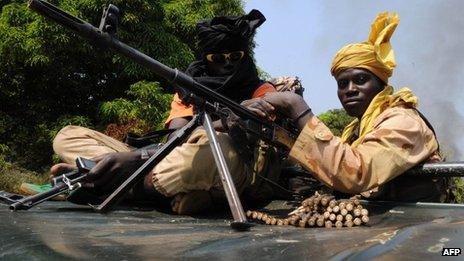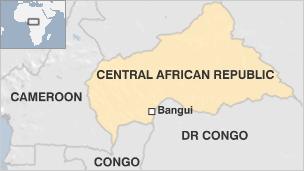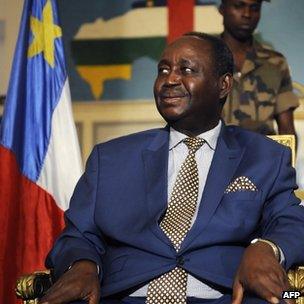Central African Republic: President Bozize flees Bangui
- Published

Rebels are reported to have seized the presidential palace
Rebels in the Central African Republic have taken the capital, Bangui, after President Francois Bozize fled.
Witnesses reported gunfire as the Seleka rebel coalition took the presidential palace, followed by chaos and looting in the city centre.
Mr Bozize arrived with his family in the Democratic Republic of Congo, a Congolese official said.
The rebels, involved in an on-off rebellion since December, say Mr Bozize failed to honour a peace deal.
On Sunday, witnesses and government officials confirmed that they had taken control of Bangui.
South African peacekeepers in CAR to support government troops suffered casualties but failed to stop the rebel advance.
Justin Kombo Moustapha, secretary-general of Seleka, appealed for calm and called on citizens to "welcome the revolutionary forces of Seleka".
"Central African Republic has just opened a new page in its history," he said in a statement.
'Common future'
Nelson Ndjadder of Seleka's CPSK faction said the country should now move into a transition towards democratic elections.

"With the taking of Bangui and the departure of Bozize, the main objective of our struggle has been realised," he said.
"Central Africans must meet around a table to decide the path for their common future."
A Paris-based rebel spokesman Eric Massi told AFP news agency that the rebels had secured Bangui and military camps and were deploying across the capital "to launch security operations and prevent looting".
But Amy Martin of the UN's humanitarian agency, OCHA, told the BBC World Service that looting was happening.
"The situation in town is chaotic in the sense than communities are looting properties, private properties, even a paediatric hospital we understand has been looted," she said.
"Our main concern right now is at the community level, with the looting and the possible tensions between various ethnic groups."

Francois Bozize came to power in a coup in 2003
South African troops retreated to their barracks and were seeking safe passage to the airport, Ms Martin said.
She added that Bangui been without power since Saturday, and that this meant water had also been cut.
She also said the situation in the interior thought to be worse than in the capital, more than 170,000 estimated to have been displaced within the country and others fleeing to Chad and the Democratic Republic of Congo.
DR Congo government spokesman Lambert Mende said Mr Bozize's wife, children and other relatives had fled to the Congolese town of Zongo.
Mr Bozize also travelled to Zongo, from where he was expected to be moved with his family to the district capital of Gemena, a Congolese official told the BBC.
UN officials said 26,000 people had arrived in Zongo from CAR, and the numbers were rapidly increasing.
UN concern
Former colonial power France has called for an emergency meeting of the UN Security Council.
It has sent 350 soldiers to ensure the security of its citizens, a senior official told AFP, bringing the total number of French troops in CAR to nearly 600.
"I call upon all sides to show the greatest restraint," said French Foreign Minister Laurent Fabius, urging French nationals to stay at home.
The UN Security Council voiced concern about the rebel advance on Friday, amid reports of killings, rapes and torture.
The rebels joined a power-sharing government in January after talks brokered by regional leaders to end a rebellion they launched last year.
But the deal quickly collapsed, with the rebels saying their demands, including the release of political prisoners, had not been met.
Observers say Mr Bozize kept the army weak because he was afraid of a military coup.
He came to power himself in a coup in 2003.
CAR, which has a population of about 4.5 million, has been hit by a series of rebellions since independence from France in 1960.
It is one of the poorest countries in Africa, despite its considerable mineral resources.
- Published23 March 2013
- Published12 January 2013
- Published11 January 2013